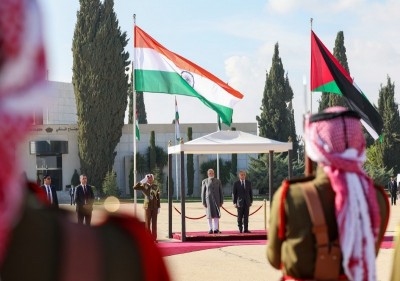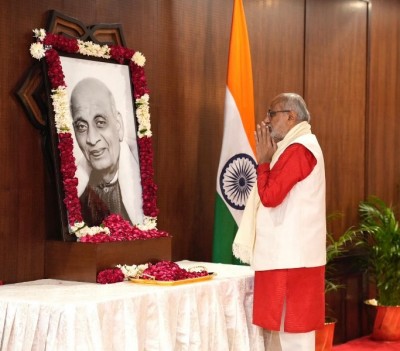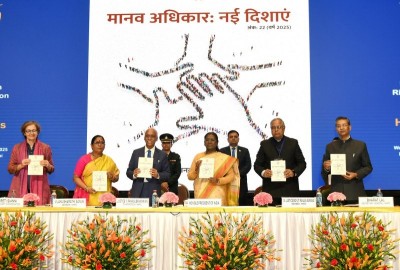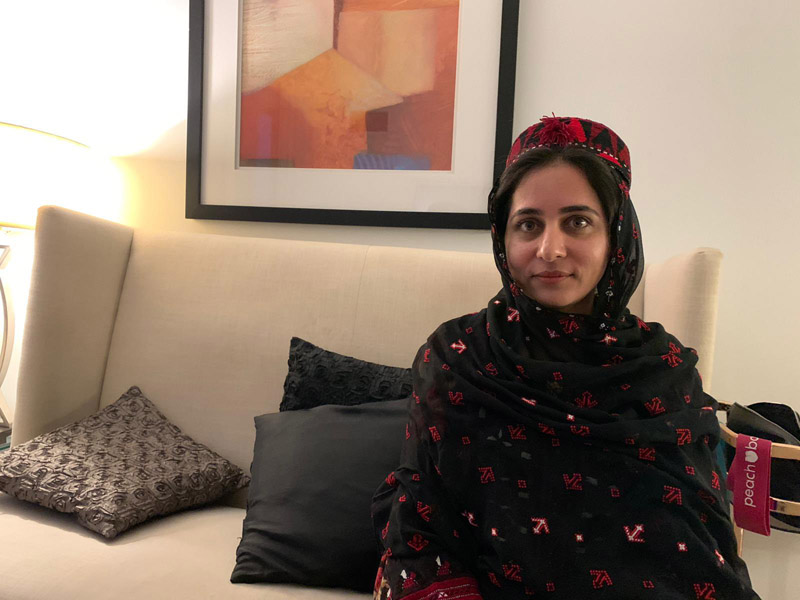 Karima Baloch
Karima Baloch
The killing of Pakistani dissidents abroad is a dangerous trend that urgently needs to be arrested
The untimely and unexplained death this week of Karima Baloch, the 37-year-old Baloch activist who had fled to Canada to escape persecution at the hands of Pakistani security agencies and was living as a refugee there, has sent shock waves across the sizeable community of Pakistani refugees who have been forced out of their hearths and homes with little option other than to seek shelter in perceptibly safer lands.
This community now finds itself under attack from unseen assailants, and has begun to question the fate that awaits them when even their first world hosts seem unable, or worse still disinterested, in assuring them their right to life, the most basic of all rights, that they had already had the misfortune of losing once afore in their homeland.
The effort to brush the cause of Karima’s death under the carpet, as appears to be happening at the moment, has not only put this dissident expatriate Pakistani community sheltering across the Western world on the tenterhooks, but has also raised weighty questions worthy of serious consideration.
On 20 December Karima Baloch left home at midday for a walk on Toronto’s Centre Island as she often did, but never returned.
She was last seen at approximately 3 pm in the Bay Street and Queens Quay West area.
Toronto police put out an appeal for information on Twitter, but a day later on 21 December her body was found drowned on an island near the lakeshore. Her husband Hammal Haider identified her body.
Another Pakistani refugee in Canada, Lateef Johar Baloch, who like Karima is also a human rights activist, said to an Al Jazeera representative over telephone that “I am with her family [and] I was there when police came to us and confirmed that they found her body. It is confirmed that she is dead, and her body was found from water near Toronto”. Lateef added in a conversation with The Guardian that “The police have not provided any further details. They have not told us the cause of death nor have they returned the body of Karima”.
On the morning of 22 December Caroline de Kloet, a Toronto police media relations officer, confirmed that Karima’s body had been located. She informed that “It is currently being investigated as a non-criminal death and there are not believed to be any suspicious circumstances”. The Toronto police subsequently issued a statement asserting that it was “aware of heightened community and media interest surrounding a missing person investigation. The circumstances have been investigated and officers have determined this to be a non-criminal death and no foul play is suspected”.
This statement indicated that the Toronto police had closed the case within two days, completely ignoring the wave of appeals for a more thorough investigation that were being made by several quarters.
The police did not provide any further details regarding the death, the circumstances surrounding which remained unexplained.
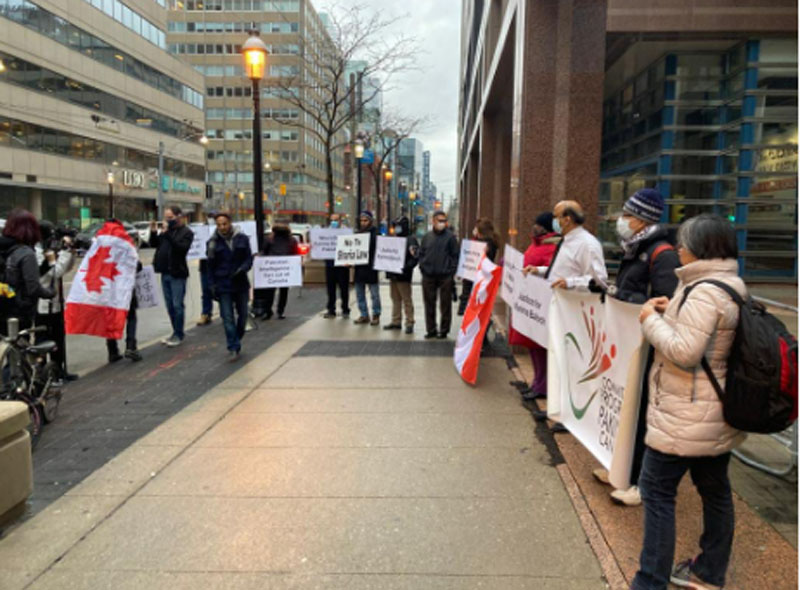
In her activism, Karima had laid emphasis on fighting for the rights of Baloch women, and had highlighted how the legal system and religious groups in Pakistan would use the State and social machinery to intentionally target women, particularly those from vulnerable groups.
She was also highly critical of the atrocities meted out to the people of Balochistan, and had used her social media profile to highlight abductions, torture, forced disappearances and other human rights violations by the Pakistani military establishment against the people of Balochistan.
Karima had also eloquently raised these issues at the 39th Session of the United Nations Human Rights Council (UNHRC) in Geneva in 2018. Aptly, in her last tweet on 14 December, Karima had shared a report by The Guardian titled ‘Kidnap, torture, murder: the plight of Pakistan’s thousands of disappeared’.
Karima had been forced to flee to Canada in 2017 and seek permanent political asylum there after repeated threats to her life from Pakistan’s intelligence agencies. Her husband, also a Pakistani activist living in exile, said that “She left Pakistan as her home was raided more than twice. Her uncle was killed. She was threatened to leave activism and political activities but she did not and fled to Canada”. BBC reported that “Several members of Ms Baloch's extended family had been linked to the Baloch resistance movement over the years, and two of her uncles - a brother of her mother and a brother of her father - had gone missing. Their dead bodies were later found.”
Pointing out that Karima had been included in BBC’s list of 100 inspirational and influential women for 2016, in which she was described as a campaigner “for independence for Balochistan from Pakistan,” the BBC report added that Karima had been forced into exile due to threats from the Pakistani Army and intelligence agencies after terrorism charges were filed against her by Pakistani agents.
Al Jazeera described Karima as “a prominent ethnic Baloch rights activist” who had “led the Baloch Student Organisation’s Azad faction (BSO-A), an organisation at the forefront of the political movement calling for the independence of Pakistan’s ethnic Baloch areas and documenting alleged human rights violations there”.
It added, “Baloch activists, particularly those calling for independence, have been subject for years to a sustained and documented campaign of enforced disappearances and extrajudicial killings, local and international rights groups say. Located in Pakistan’s southwest, Balochistan is the country’s largest but least populated province and is rich in minerals and other resources.
Baloch rights groups have long decried what they term Pakistan’s extractive policy towards the region, mining it for resources but leaving it languishing at the bottom of most socioeconomic indicators in the South Asian country. For more than a decade, armed ethnic Baloch groups have also been fighting a separatist war against Pakistani security forces, killing many Pakistani security forces and civilians in attacks they say are aimed at achieving independence.
Pakistan’s military routinely denies allegations of rights abuses, saying most of the region’s ‘missing people’ are members of armed groups who fled their homes voluntarily”.
News of Karima’s death was received with shock by human rights groups, Baloch activists, politicians and journalists alike, who have all called for a thorough investigation.
Pakistani exiles living in asylum in Western countries have been especially vocal. Several have questioned the Toronto police’s haste in announcing closure of their investigation without taking cognizance of the potential role of external State actors.
Karima’s husband Hammal Haider led such calls. He said, “My wife was an immensely courageous and spirited person. Her work as an internationally prominent activist speaks for itself. I believe it’s our right to request the Canadian authorities to leave no stone unturned in looking into the circumstances of her death as well the threats she has been facing since moving to the country. We have cooperated with the police and will continue to do so”.
Haider elaborated that after he had raised the issue of human rights abuses and military operations by the Pakistani military in Balochistan, he had received multiple threatening messages over social media. He added, “I was told that my brothers and wife can be targeted”.
Lateef Johar told the BBC that Karima had received anonymous threats a week ago warning that someone would send her a “Christmas gift” and “teach her a lesson”. He also recalled that “She had received threats from unknown Pakistani numbers on WhatsApp after a few Baloch students were abducted in late 2017. Those threats also mentioned me. She was asked to come back to Pakistan and told that if she comes back, the cases against her would be quashed and those abducted students would be freed”.
Karima’s sister Mahganj Baloch described Karima’s death as “not only a tragedy for the family, but also for the Baloch national movement”. Mahganj added, “She didn't go abroad because she wanted to, but because... open activism in Pakistan had become impossible”.

In an open letter, a group of dissident Pakistani organizations including the Baloch National Movement, Balochistan National Party - Canada, World Sindhi Congress - Canada, Pashtun Council Canada, and Pashtun Tahaffuz Movement Committee Canada has urged the Canadian government “to undertake immediate and thorough investigation, bring the perpetrators to justice, and take just, diplomatic and political course of action in case any foreign country or group were found to be involved in the brutal murder of this human rights activist”. The group warned that “any lack of concrete action to this end might jeopardize the global image that Canada has”. Prominent activist Gulalai Ismail, herself living in exile in the US after escaping from Pakistan in 2019, said, “I am devastated by the fact that even refuge in Canada couldn’t save her life. The stories of Baloch don’t change. They go missing and are then found dead. Be it Pakistan, Sweden or Canada”.
Taha Siddiqui, another Pakistani dissident based in France, in a series of tweets joined a chorus of voices that pointed fingers for Karima’s death at the Pakistani military establishment. He wrote, “Most Pakistanis posting about #KarimaBaloch are restricting themselves to ‘expressing’ grief about her death. We DON'T need your grief but your OUTRAGE also. SPEAK UP & name the suspect: #PAKISTANARMY. This self censorship is why we are where we are!”
He added, “We should not only consider the police statements in this case but also look at #KarimaBaloch's recent speech abt threats to Baloch in Canada due to Pak army people settling there”. In yet another tweet, he wrote, “I spoke to close family friends of #KarimaBaloch. They've rejected initial police statement. They emphasize Karima was threatened by #PakistanArmy even in exile. She voiced those fears. We must not ignore the context & must understand tht an #ISI op wont leave footprints behind!”
Notably, Canadian Member of Parliament (MP) and former cabinet minister Michael Chong expressed serious concern over Karima’s death, and insinuated that the Pakistani spy agencies were engaged in carrying out “political assassinations” in Canada. Chong tweeted, “Karima Baloch, a Pakistani dissident in Toronto, was found dead - the 2nd this year. A thorough investigation is needed to ensure no foul play was involved. Very disturbing if political assassinations are taking place on Canadian soil”. Equally significantly, and in contradiction to the “case closed” attitude of the Canadian police, Amnesty International said that “The death of activist Karima Baloch in Toronto, Canada is deeply shocking and must be immediately and effectively investigated. The perpetrators must be brought to justice without recourse to the death penalty”.
Concern over Karima’s death was not limited to expatriate Pakistanis and rights organizations alone; it reverberated within the depths of Pakistan too. The Human Rights Commission of Pakistan demanded “a thorough investigation” into the unexplained death, and noted that “this is the second such incident after the disappearance & death of journalist Sajid Baloch in Sweden”.
Pashtun Tahaffuz Movement (PTM) leader Manzoor Pashteen tweeted, “Shocked & devastated by the sad news of #KarimaBaloch killing in Canada. Her killing is a huge loss for all the oppressed nations struggling for the right to life & dignity. Better that culprits are arrested & such hounding be stopped. We convey our condolences to the Baloch nation”.
Protest rallies were organized across Balochistan and in Karachi, in which Karima’s death was described as a “murder” and the demand for a fair investigation was voiced.
Unfortunately, Karima is not the first Pakistani dissident sheltering abroad to die in highly unusual and unexplained circumstances. Sajid Hussain, a Pakistani activist and journalist who often wrote on human rights violations in Balochistan and was living in self-imposed exile in Sweden, went missing on 2 March this year, and his body was found almost two months later in a river near the Swedish town of Uppsala.
Like Karima, Hussain had fled Pakistan in 2017 and had sought political asylum in Sweden after he had been subjected to death threats, police raids, interrogation and other harassment for his work. As in Karima’s case, Swedish police quickly ruled out any “visible wrongdoing” and held the cause of death to be drowning. Hussain’s family was as unconvinced of the veracity of this conclusion as Karima’s is now. Even Reporters Without Borders said at that time that there was “a strong possibility that he was killed in connection with his work as a journalist”.
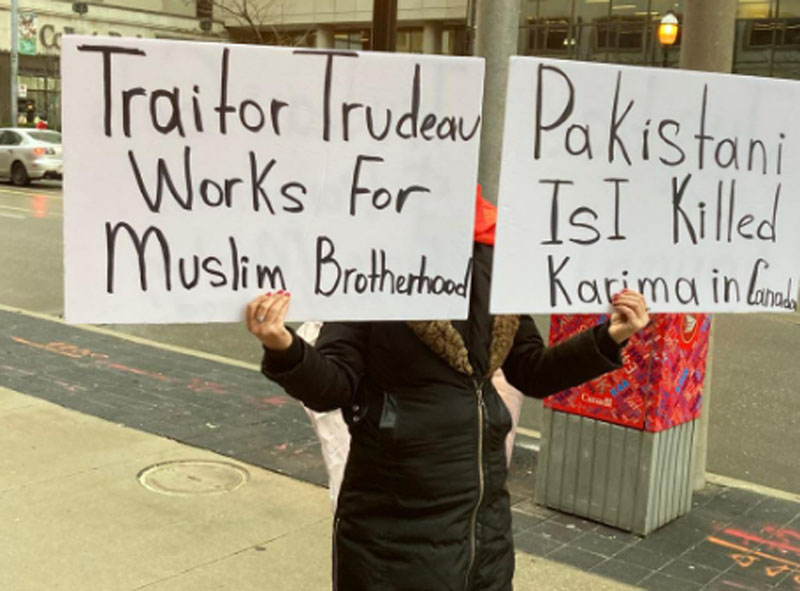
Alarmingly, in addition to these two sad deaths, there have been other instances of physical violence and intimidation targeting dissident Pakistani refugees living in Europe. On 2 February this year, blogger Ahmad Waqass Goraya was assaulted outside his home in Rotterdam, The Netherlands. The subjects of Goraya’s writing include human rights violations and torture by the Pakistani military and the Inter-Services Intelligence (ISI). Describing the incident, Goraya said, “I was on the phone when a man appeared and began punching me in the face while I saw another man with him filming the attack”. Speaking in Urdu with a Pashtun accent, the man hitting Goraya threatened to kill him and told him he knew exactly where he and his family lived.
Daniel Bastard, the head of the Asia-Pacific desk of Reporters Without Borders, urged “the Dutch police to concentrate on the hypothesis that the ISI was behind this attack and to guarantee Ahmad Waqass Goraya’s safety”. He added, “If it is confirmed that the ISI was responsible for this shocking attack, it would set an unacceptable precedent and would constitute a flagrant violation of Dutch sovereignty. We therefore urge Dutch foreign minister Stef Blok to immediately summon Pakistan’s ambassador to The Hague and demand an explanation”.
Taha Siddiqui, a prominent Pakistani journalist known for his strident criticism of the military, had fled Pakistan in 2018 after he escaped an attempted abduction. He was granted political asylum in France later that year. Siddiqui told Al Jazeera that he had received multiple warnings from the United States (US) and French intelligence agencies since he moved to Paris regarding threats to his life, and documented at least three incidents of surveillance of his activities there. “In Pakistan, we are seeing that there has been a growing oppression and crackdown and suppression of independent voices”, he said. “Now that they’ve done it at home, it seems they are replicating that model and expanding this model globally”.
That Pakistan may have adopted such a model abroad would not be surprising given that the most influential figure that the all-powerful Pakistani Army has had this century, the former Army Chief cum military dictator General Pervez Musharraf, in a recent interview spoke unabashedly and passionately about the need for the Pakistani military establishment to go after and assassinate its critics on the soil of the countries in which they had sought refuge. Claiming that all countries practiced this, Musharraf expressed confidence that Pakistan could always maintain deniability after such killings. He even coined a term for this line of activity – “proactive diplomacy”.
The killing of Pakistani dissidents abroad is a dangerous trend that urgently needs to be arrested. If left unimpeded, the trend could sneakily metamorphose into the norm rather than the exception, with the exception being horribly wrong and unwanted to begin with. The only way this can be stalled is if the countries that have graciously hosted these dissidents collectively send the message across to Pakistan that it is seriously breaching the red line, the consequences of which would be severe.
There are several reasons why the host countries would do well to re-examine their “non-criminal” interpretation of these deaths and assaults. People like Hussain and Karima are too battle hardened to commit suicide – they have defended themselves for years against the assaults and the brutality of the military establishment within Pakistan. Having escaped those horrors and arrived at much more secure and comfortable locations, they could hardly be characterized as likely candidates for suicide. As Hammal Haider said of his wife, “I can’t believe that it’s an act of suicide. She was a strong lady and she left home in a good mood. We can’t rule out foul play as she has been under threats”. Equally unlikely is that they were careless enough to have toppled over accidently into icy waters. It would also appear from what has emerged so far that the threats mentioned by Haider above have not been adequately factored into the investigations, nor has the character of the Pakistani State. The near identical modus operandi in both the deaths this year should also raise antennae.
In addition to national responses, multilateral agencies such as the UNHRC and the UN High Commissioner for Refugees (UNHCR) also need to wake up to the killings and assaults and live up to the mandates given to them. The UNHRC has a duty to delve deeper into the death of Karima as she has been a meaningful contributor to the dialogue within the UNHRC’s hallowed walls. If human rights activists continue to be bumped off as Karima was, there may be no one left to tell the UNHRC the important narrative of the Pakistani State’s excesses.
Writing one-sided reports within secure offices in Geneva because the other side refuses to grant the UNHRC any access whatsoever is exactly the kind of activity that would encourage terrorist-sponsoring countries such as Pakistan to continue on their merry ways, and it would even embolden them to expand into assassinations overseas.
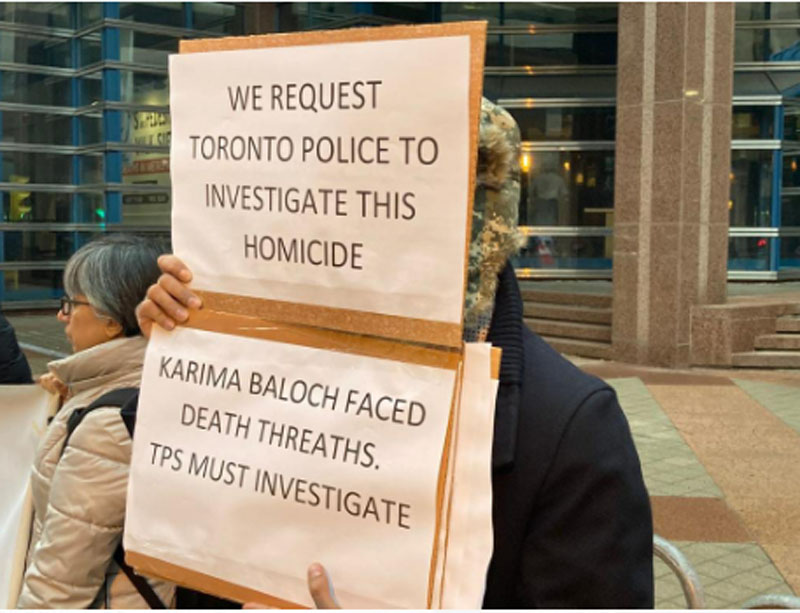
Such reports may engender an erroneously comforting sense of productivity and achievement in those that author them, but in reality they reflect a rather lazy and careless outlook to the job at hand.
Getting one’s hands and feet dirty in digging out the reality behind Karima’s killing could be an infinitely more rewarding, gratifying and meaningful accomplishment. Sadly, even a statement condoling Karima’s death has been a bridge too far for the UNHRC.
After Karima’s death, the fear that has gripped the Pakistani refugee community is real and palpable. As Lateef Johar put it, “I don’t think this is an accident or an act of suicide. We all feel threatened here”.
The plight of the refugee community is acute, as there is no one to really stand up for them should they become targets for assassination for the irresponsible and brutal regimes that they had escaped from.
They have no embassy or consulate left that would enquire about them. In the cases of Hussain and Karima, the Pakistani Embassies in Stockholm and Ottawa are highly unlikely to pressurize their two host governments to dig deeper into the deaths.
It is, therefore, up to the countries hosting these Pakistani dissidents as well as the UN organizations mandated with the welfare of refugees and the protection of human rights to do all that needs to be done.
As for Musharraf and his uniformed successors in Rawalpindi, it may be useful to bear in mind that not all countries practice “proactive diplomacy”; only rogue nations do, that too only till they are inevitably exposed and called out for what they really are.
Support Our Journalism
We cannot do without you.. your contribution supports unbiased journalism
IBNS is not driven by any ism- not wokeism, not racism, not skewed secularism, not hyper right-wing or left liberal ideals, nor by any hardline religious beliefs or hyper nationalism. We want to serve you good old objective news, as they are. We do not judge or preach. We let people decide for themselves. We only try to present factual and well-sourced news.





